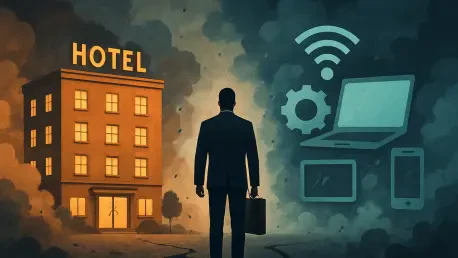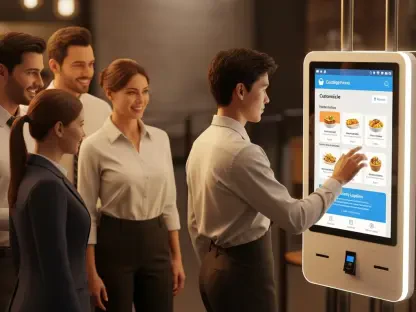The old hospitality playbook can no longer apply successfully to a world that’s become technology-first in just a few years. The market is marked by some fierce competition, razor-thin margins, and disruptions that put even the most adaptive businesses in a tough spot. The worst part? Simplify managing your operations and maintaining the edge you’ve previously built is no longer enough; it’s a recipe for stagnation and falling behind.
Prioritizing survival and growth? That depends on proactive, strategic engagement, and this can be found by turning your hospitality enterprise into the hotspot of comfort and innovation for consumers. That’s because digital-first experiences are no longer perceived as just optional, nice-to-have opportunities, but a critical advancement and a stepping stone for your next market differentiator.
These insights offer you a full outlook on what’s driving this boom, why the benefits move beyond surface-level benefits when it comes to tech, and why capitalizing on innovation can solve some of your most pressing B2B challenges in hospitality today.
The Technology Arms Race. What Happens Beyond the Buzzwords?
All industries currently have one critical driver: the need to rapidly and efficiently master technology. Digital transformation has turned from a potential differentiator to the one element that’ll define whether you lead in the business world or lag behind competitors.
To meet standards that are starting to affect both the corporate world as a whole and the hospitality industry, hoteliers must also take action to adapt. More important than ever, having a fully integrated tech stack that enhances both guest experience and operational efficiency is what’ll make you stand out among your peers.
While moving beyond simple buzzwords and implementing practical applications when it comes to artificial intelligence isn’t easy, it’s not that difficult either if you focus on what matters most. A good place to start your transformation? Shifting from simply having a guest app to deploying AI-driven personalization engines that offer you a bigger chance to increase ancillary revenue. Recent industry research shows the difference: the hotels integrating these AI-powered property management and guest relations systems can see up to a 20% increase in repeat bookings.
So, it’s becoming quite clear that this shift is becoming the core business change that might help hospitality enterprises truly make a difference (even through just upgrading outdated systems that might be limiting their performance). For example, some companies have recently replaced their legacy customer relationship management platform with a new guest messaging system that reduced front-desk queries by 40%. This change had several beneficial outcomes: more positive online reviews, an improved impact on RevPAR, and enhanced communication between staff and customers.
Why Technology Is What You Need to Win the Post-Pandemic War for Hospitality Talent
The pandemic has had a great impact on the hospitality sector, with effects that have not yet given way to full recovery. One of the most severe pain points lies in a severe and persistent talent shortage, both due to high turnover rates and a widening skill gap, which might not only undermine service quality in the long run, but also significantly stunt growth.
Here, technology isn’t just a workaround that might help you address some issues. It’s the one element that’ll help you face any pain points or friction related to employee retention. Smart workforce management systems, AI-enabled scheduling platforms, and integrated HR can optimize labor allocation, reduce burnout, and maintain consistent staff engagement. They’re also the one vital key for anticipating forecast peak demand periods (so unpredictable in a disrupted economy), matching worker levels accordingly, and preventing understaffing, which is one of the most common complaints among workers and guests alike.
Beyond just scheduling, learning and development are two other aspects of hospitality workforce management being heavily targeted by technology. With AR/VR and AI-based training programs, hoteliers can onboard and upskill staff quickly through realistic scenarios, even across multiple languages and roles. Gamified learning paths, accessible via mobile apps, are also replacing the much less efficient and outdated training binders, making it easier for employees to gain confidence, improve their performance, and remain more engaged with your business.
Operational Efficiency: Here’s Why It’s Not Just a Back-End Concern
Even as you actively invest in the right technology, there’s one mistake you can easily make: investing only in the solutions that drive efficiency ‘behind the scenes’ (through improvements usually confined to revenue, performance, or customer management tooling). While these solutions are certainly essential, they’re only one piece out of a much larger puzzle.
Because, the truth is, consumers don’t care about your backbone infrastructure. They are attracted to what they can see and perceive directly, and their journey starts long before they step through your lobby’s doors. It doesn’t matter whether it’s an online, personalized booking experience, real-digital concierge services, or biometric check-in; the guest-facing tech stack is as essential as what you’re operating out of sight.
An example? Keyless entry, which might appear as another gimmick. But it’s actually a cost-saving, efficiency-enhancing solution that reduces the need for physical keys (and the usual overhead involved), improves security, and creates a smoother, more pleasant holiday for your guests. Similarly, smart thermostats and occupancy sensors provide a customized, luxurious journey, reduce energy usage, and create a culture of sustainability that might make your brand shine against competitors.
Even the dining experience itself is changing thanks to technology. QR code-based menus, kitchen forecasting tools based on the power of AI, and automated room service requests are turning hotel restaurants from logistical headaches or almost impossible to manage spaces into efficient, smooth, and guest-centric revenue streams.
Conclusion: Compete Smarter, Not Just Harder
Disruption is here to stay for a while longer. Success means being able to thrive even with uncertainty, and having the means to impress a range of customers who are more careful than ever with their travel bookings. Digital innovation is your new battleground, and the trials aren’t related to just gadgets or dashboards. They encompass the hotel as a whole, from the ground up. Whether it’s about operations, guest experiences, talent acquisition, or sustainability, technology is the key to upgrading each layer of hotel management.
Those who see it as a one-time investment are most likely to fall behind. But those who treat it as a continuous, strategic enabled will unlock a new advantage in an industry that’s currently demanding nothing less than peak excellence.









